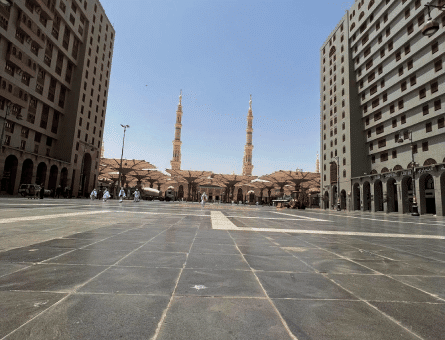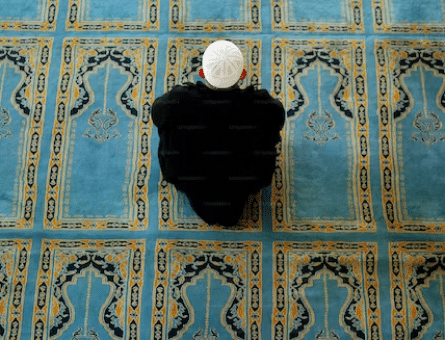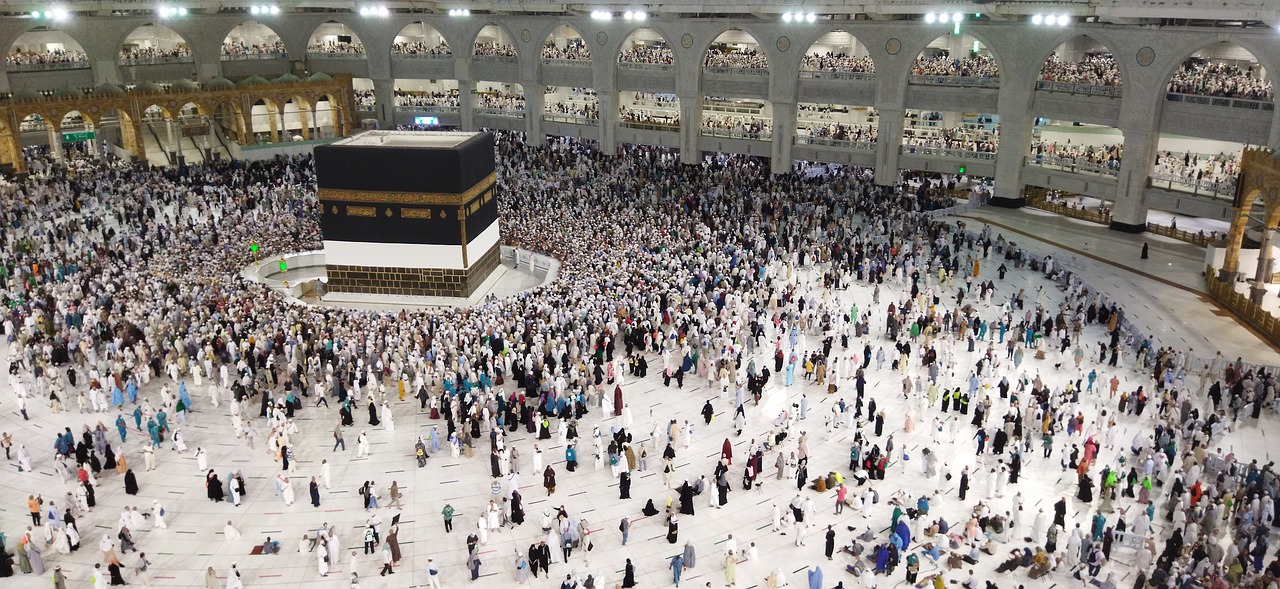What Is The Age Limit For Hajj in 2024?
Every year, millions of Muslims from around the world flock to Mecca, Saudi Arabia, to perform the Hajj pilgrimage. Hajj is a sacred journey and one of the five pillars of Islam.
It is an obligation for all Muslims who are physically and financially capable of undertaking the journey. However, age can be a limiting factor for some people who wish to perform the Hajj pilgrimage.
In this guide, we will do an in-depth discussion on the age limit for Hajj 2024.
What Is the Minimum Age Limit for Hajj 2024?
There is no minimum age limit for Hajj in Islam. However, it is recommended that a person should be physically and mentally capable of undertaking the journey before performing Hajj.
The Kingdom of Saudi Arabia has set the minimum age for performing the Hajj pilgrimage at 12 years. 
This announcement was made in light of the restoration of pilgrim numbers to pre-pandemic levels, as announced by the Minister of Hajj and Umrah, Tawfiq al-Rabiah, during the opening of the Hajj Expo 2024.
The decision to raise the minimum age requirement for Hajj is likely due to safety concerns, as it may not be appropriate for children under 12 years of age to undertake the journey.
Moreover, children under the age of 18 must be accompanied by a guardian or a mahram.
What Is the Maximum Age Limit for Hajj 2024?
There is no maximum age limit for Hajj 2024. However, the Saudi government advises that elderly people and those with underlying health conditions consult their doctors before embarking on the Hajj journey.
Hajj involves a lot of walking, standing, and physical exertion, which can be taxing on the body. Elderly people who wish to perform Hajj must be in good health and able to endure the journey.
Can a 65-Year-Old Go to Hajj?

Yes, there is no age limitation for a 65-year-old individual to perform Umrah or Hajj, provided they are physically and mentally capable of undertaking the journey.
However, they are advised to consult their doctor before embarking on the journey. Hajj or Umrah can be physically demanding, and elderly people must be in good health to endure the journey.
Can a 75-Year-Old Go to Hajj?
Individuals who are 75 years old can participate in the Hajj pilgrimage as long as they are physically and mentally capable of completing the journey.
However, before undertaking the pilgrimage, they are advised to seek medical advice from their doctor.
As the Hajj pilgrimage can be physically demanding, elderly people must be in good health to undertake the journey.
Therefore, consulting a doctor beforehand can help determine if the individual is fit enough to participate and if any precautions need to be taken.
It is important to ensure the safety and well-being of all Hajj pilgrims, and taking necessary precautions can help make the journey smoother and more enjoyable for all involved.
How Much Does Hajj Cost for Kids?
The cost of Hajj for kids varies depending on their age and the package they choose. Children under the age of two can travel with their parents for free.
Children between the ages of two and twelve can get a discount on the Hajj package, which can be up to 50% of the adult price. The cost of the Hajj Pilgrim package for children over the age of twelve is the same as that for adults.
Who Is the Oldest Person to Perform Hajj?
Performing Hajj requires a great deal of physical endurance, and many pilgrims are concerned about whether they will be able to complete the rituals.
However, age is not necessarily a barrier to performing Hajj, and there have been many elderly people who have successfully completed the pilgrimage.
As per the news, in 2019, a 104-year-old Indonesian woman, Ibu Mariah Marghani Muhammad, became the oldest person to perform Hajj. She made the journey with her family and was assisted by the Indonesian government’s Hajj mission.
Her age did not deter her from fulfilling her lifelong dream of performing Hajj, and she served as an inspiration to many and made it to the news all around the globe.
Hajj Restrictions
The Saudi government has implemented several restrictions for the Hajj pilgrimage in 2021 and 2022 due to the COVID-19 pandemic. The number of pilgrims was significantly reduced, and only citizens and residents of Saudi Arabia were allowed to perform the Hajj.
The Hajj pilgrimage was also restricted to people between the ages of 18 and 65 who were fully vaccinated or had recovered from COVID-19 influenza virus. However, all these restrictions have been lifted now.
The Minister of Hajj and Umrah Tawfiq al-Rabiah made a news announcement at the Hajj Expo 2024 that Saudi Arabia will not be imposing any restrictions, including age limits, on Hajj pilgrims in 2024. He further stated that the number of pilgrims would be restored to pre-pandemic levels.
However, individuals aged 12 and above who wish to participate in Hajj this year must have received the basic doses of vaccines that are approved in the Kingdom. Along with the vaccination requirement, they must also provide a negative PCR test taken no more than 72 hours before their arrival in the Kingdom.
This decision is likely to benefit millions of Muslims around the world who were eagerly waiting to perform Hajj after missing it in 2020 and 2021 due to the pandemic.
The Saudi government has taken several measures to ensure the safety and well-being of the pilgrims, including increasing healthcare services and deploying security forces to manage the crowds.
The decision to lift restrictions and allow more pilgrims to participate in Hajj is expected to boost the economy of Saudi Arabia, as Hajj is an important source of income for the country.
Who Is Exempt from Performing Hajj?

While performing Hajj is an important aspect of the Islamic faith, there are certain circumstances under which a Muslim may be exempt from performing Hajj. These include:
- Financially Challenged
Muslims who cannot afford the cost of the Hajj pilgrimage are exempt from performing it.
- Children
Children who have not yet reached the age of puberty are exempt from performing Hajj. They are not required to perform any of the Islamic obligations until they reach the age of puberty.
- Mentally Challenged
People with mental disabilities are also exempt from performing Hajj. They are not required to perform any of the Islamic obligations.
- Terminally Ill
People who are terminally ill or have a serious illness that prevents them from performing Hajj are exempt. They are advised not to undertake the journey and put their health at risk.
- Elderly
Elderly individuals who are physically unable to undertake the journey are also exempt from performing Hajj. This includes those who are unable to perform the rituals due to age-related health problems or disabilities.
- Pregnant Women
Pregnant women are exempt from performing Hajj due to the potential risk to their health and the health of their unborn child. The pilgrimage can be physically demanding and may require a lot of walking and standing, which can be harmful to pregnant women.
There are several verses in the Quran that mention those who are exempted from performing Hajj:
In Surah Al Imran (3:97), Allah says: “
This verse suggests that Hajj is obligatory only for those who are physically and financially able to undertake the journey. Those who are unable to do so are exempted from performing Hajj.
In Surah Al Baqarah (2:196), Allah says:
This verse highlights that those who are prevented from performing Hajj due to illness or other legitimate reasons are allowed to offer a ransom of fasting, charity, or sacrifice in lieu of Hajj.
In Surah Al Baqarah (2:196), Allah also says: “Hajj is [during] well-known months, so whoever has made Hajj obligatory upon himself therein [by entering the state of ihram], there is [to be for him] no sexual relations and no disobedience and no disputing during Hajj. And whatever good you do – Allah knows it. And take provisions, but indeed, the best provision is fear of Allah. So fear Me, O you of understanding.”
This verse implies that those who do not enter the state of ihram and perform Hajj are not obliged to do so. Therefore, they are exempted from performing Hajj.
The Quran mentions that those who are physically and financially unable to undertake the journey, those who are prevented from performing Hajj due to illness or other legitimate reasons, and those who do not enter the state of ihram are exempted from performing Hajj.
It is important to note that those who are exempt from performing Hajj are not required to make up for it at a later time. However, they can perform Hajj if they are physically and financially able to do so at a later time.
Summary – Age Limits of Hajj
The Hajj pilgrimage in Mecca is an obligation for all physically and financially capable Muslims. The minimum age for Hajj in Saudi Arabia is 12 years due to safety concerns, but there is no maximum age limit.
The cost of Hajj for children varies depending on their age and package. The Saudi government imposed restrictions on Hajj pilgrims in 2021 and 2022 due to the COVID-19 pandemic, but they will not be imposing any restrictions on Hajj pilgrims in 2024, provided they have received approved vaccines.
Explore The New Pilgrim App
The Ultimate App
for Hajj and Umrah!














